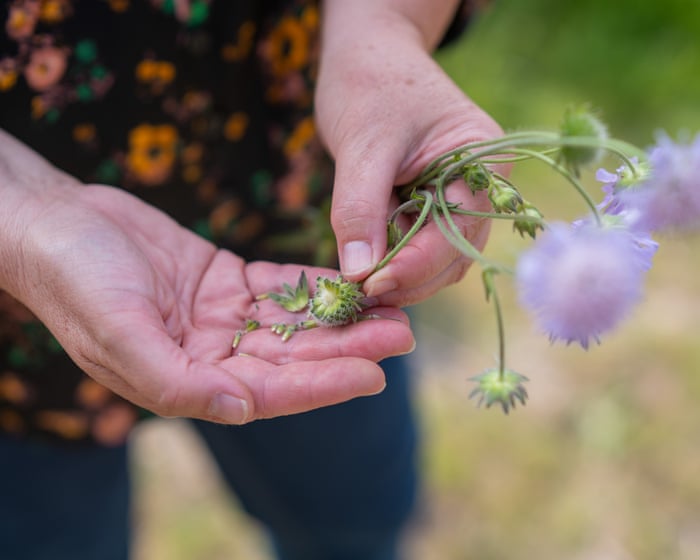The National Wildflower Centre (NWC) has warned that rising spring temperatures and unpredictable autumn weather are making it even harder to restore the UK’s lost meadows.
The centre, which marks its 25th anniversary next month, supports projects to revive wildflower-rich meadows—97% of which have disappeared over the last 80 years. Juliet Rose, head of development at the Eden Project where the NWC is based, says shifting weather patterns due to climate change are making it difficult to find the right time to sow wildflower seeds.
“We’ve seen spring plantings fail or show signs of stress, especially during the hot springs we had during the pandemic and again this year,” she said. “If you sow in spring, the young plants can literally fry.”
When the National Wildflower Centre began, there were two clear sowing windows: early autumn and spring. Now, spring plantings are increasingly at risk, particularly without controlled watering.
This year has been especially tough. The Met Office reported that spring 2025 brought unprecedented warmth and sunshine to the UK.
Rose added that autumn is also becoming less reliable, with unpredictable wet spells making it hard to get seeds into the ground. “The growing window is being squeezed at both ends,” she said.
Species like primrose, cowslip, and yellow rattle—which need cold periods to germinate—are especially vulnerable to climate shifts. Many growers have reported lower yields of perennial flowers this year due to the unusually hot spring.
“We need more research to understand how climate change affects wildflower habitat creation, particularly rising temperatures and shifting rainfall patterns,” Rose emphasized.
To mark its anniversary, The Guardian visited the NWC greenhouses, set on high ground above Eden’s biomes. There, seeds harvested from a farm on the Cornish coast are being dried. A machine then separates the wildflower seeds from other material. This autumn, seeds like cornflower, corncockle, corn marigold, and ribwort plantain will be sown.
Despite the challenges, Rose remains hopeful. The NWC was founded as a millennium project with the goal of getting more people from all backgrounds involved in restoration.
“There’s a real joy in scattering seeds,” she said. “Anyone can do it. It connects you to others and to past generations. With so much bad news, this is something positive we can actually do. I’ve never met anyone who doesn’t enjoy sowing seeds.”
The centre helps individuals, communities, businesses, local authorities, and NGOs plant wildflowers in fields, churchyards, roundabouts, business parks, and housing estates.
In Cornwall, more than 10,000 devil’s-bit scabious plants have been sown along a main road to support the threatened marsh fritillary butterfly.
The NWC has also brought wildflowers to inner-city Liverpool—including Toxteth, Sefton, and Anfield—and worked with the Canary Wharf Partnership to introduce them to London’s Docklands. In Dundee, parkrun participants even paused to scatter seeds as they jogged.
Sam Alford, head of nature connections at the Eden Project, works with diverse groups—including military veterans—on planting initiatives.You can see slumped shoulders straighten, confidence grow, and the thrill of watching something come to life. It’s truly wonderful.
Frequently Asked Questions
Frequently Asked Questions About Eden Projects Wildflower Center 25th Anniversary and Climate Warning
General Questions
Q What is the Eden Projects Wildflower Center
A Its a part of the Eden Project in the UK focused on preserving studying and promoting native wildflowers and their habitats
Q Why is the Wildflower Center marking 25 years with a climate warning
A After 25 years of work theyre highlighting how climate change threatens wildflowers and ecosystems urging action to protect biodiversity
Q Where is the Eden Project located
A Its in Cornwall England built in a reclaimed clay pit
About Wildflowers and Their Importance
Q Why are wildflowers important
A They support pollinators like bees and butterflies improve soil health prevent erosion and add beauty to natural landscapes
Q How does climate change affect wildflowers
A Rising temperatures irregular rainfall and extreme weather can disrupt blooming cycles reduce habitats and push some species toward extinction
Q Can planting wildflowers really help fight climate change
A Yes Wildflowers capture carbon support healthy ecosystems and increase biodiversity which makes environments more resilient
Visitor and Participation Questions
Q Can I visit the Wildflower Center
A Yes its open to the public as part of the Eden Project Check their website for hours and tickets
Q How can I get involved in supporting wildflower conservation
A You can plant native wildflowers in your garden support local conservation groups reduce your carbon footprint or volunteer with organizations like the Eden Project
Q Does the Eden Project offer educational programs about wildflowers
A Absolutelythey have workshops school programs and events focused on gardening ecology and sustainability
AdvancedInDepth Questions
Q What specific climaterelated threats are wildflowers facing today
A Threats include habitat loss due to development invasive species pollution and climate shifts altering seasonal patterns critical for growth and pollination
Q How does the Wildflower Center contribute to scientific research
A They study plant species seed banking habitat restoration and how climate change impacts flora sharing findings to guide conservation



